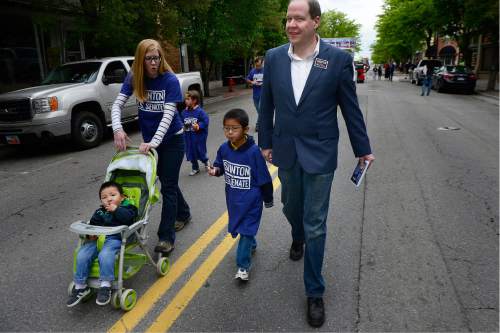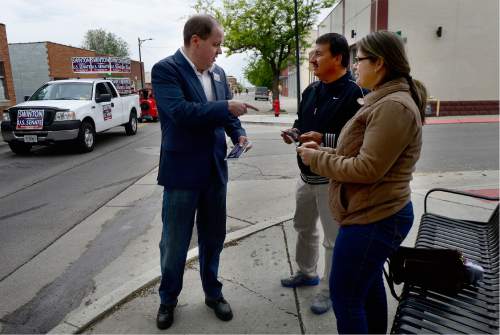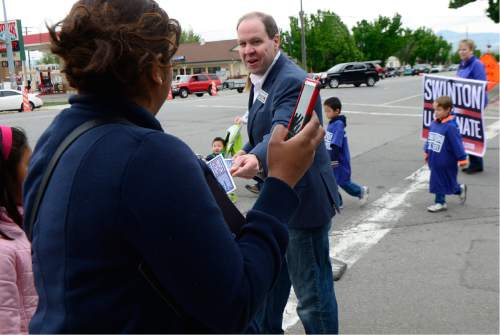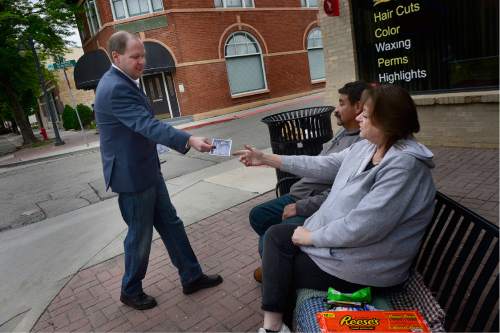This is an archived article that was published on sltrib.com in 2016, and information in the article may be outdated. It is provided only for personal research purposes and may not be reprinted.
Well before cellphones became the norm, the Swinton household had two phone lines in their home. One shared by the parents and three of the four sons, and the other for Jonathan, then a teenager.
They jokingly called it "1-800-Jonathan," a help line for his many friends.
Those marathon conversations sparked his desire to work as a counselor and that in turn led him to become a Democrat, though, like most of his family members, he originally registered as a Republican.
"I dedicated my career to helping people in circumstances that they can't figure out on their own and I really believe Democrats promote similar kinds of goals," Swinton said.
Now 35, married with two adopted sons and the owner of a marriage-counseling company, Swinton is seeking his party's nomination for the U.S. Senate. He believes a self-described conservative Democrat trained to help couples learn to compromise is just what dysfunctional Washington needs. And he believes his middle-of-the-road approach will appeal to independents and maybe even some Utah Republicans who don't favor incumbent Sen. Mike Lee.
Some Utah Democrats disagree. Despite an early start and campaign stops throughout the state, Swinton failed to claim the nomination at the party's state convention. Out of nowhere, Misty K. Snow –who, like Swinton, is new to politics, but unlike Swinton only began campaigning in mid-March – got enough delegate votes to force a June primary, largely by challenging Swinton on the issue of abortion. Swinton is pro-life and in an op-ed in The Salt Lake Tribune called for a federal investigation of Planned Parenthood. That, combined with his Mormon faith, didn't go over with some Democratic delegates, who he claims bullied his family.
"They were screamed at, sworn at and spit at to the point my wife had to hide behind the campaign table part of the day," Swinton said in an interview at his Sandy office. "I have been frustrated with some in the party who feel that you can't be a Mormon and be a Democrat."
Snow is a transgender woman and a progressive in the mold of Sen. Bernie Sanders, I-Vt. She got in the race largely because she thought Democrats deserved a more liberal choice than Swinton.
"I just think he is really bad on important issues," Snow said of her Democratic rival.
Swinton made it clear that Snow's candidacy isn't going to pull him to the left.
"A lot of people want a candidate who is going to go to Washington to fight tooth and nail for one side and I've made it clear that I have a goal to work cooperatively because I believe the best way to get a lot of what you want is to find a way to work with people," he said.
If elected, Swinton said he would seek to represent all Utah voters, even if that means setting aside his own opinion. He'd conduct polling, have his staff scour emails and phone calls, look at all the feedback and then act accordingly. But he isn't using this philosophy to duck questions about the issues.
He said he believes President Barack Obama should create a new Bears Ears National Monument in San Juan County and he sees no legitimate reason why the federal government should transfer public lands to state control. He said the government should fight climate change aggressively, while also trying to bring clean-energy industries to communities that now survive on coal-related jobs.
He wants the federal government to spend more money on higher and public education and he favors a minimum wage hike to $10 or $12 per hour. He'd advocate for immigration reform with a path to citizenship and would fight for anti-discrimination laws for lesbian, gay, bisexual and transgender people. He opposes any gender-regulating bathroom laws.
On health care, he wants to tinker with the Affordable Care Act, imposing profit caps on drugmakers and creating a government-run insurance plan to compete against the private sector.
While Swinton hasn't been active in Utah's political circles, he said running for office has been something he was interested in doing since he "was a little kid."
He grew up in Salt Lake City with "news junkie" parents. He served in the student government at Waterford High School.
Interested in politics and dead set on a job in the counseling field, Swinton went to Utah State University on a photography scholarship. He wanted to study what he loved and he still enters black-and-white images into art shows. During his LDS mission in London, he met a psychologist who told him that if he really wanted to be a counselor, he should volunteer for a crisis hotline to see if he could handle dealing with people in distress.
He volunteered at Citizens Against Physical and Sexual Abuse in Logan, taking calls and meeting abuse victims at hospitals.
"I found that I loved it and it was a great fit for my personality," he said.
Swinton got his master's degree from the University of Nebraska and his doctorate from Kansas State University. After a clinical internship, he created the company that would become Swinton and Associates six years ago.
He filed to run for Senate last August, seeing Lee as an "all or nothing" senator that has helped create gridlock. And he sees his small-business background and lack of political experience as an asset.
"I'm a regular guy and I understand what real people experience in ways that people who have been involved in politics for a long time may not," he said. "I think the Senate needs someone like me right now."
Family friend Barbara Lockhart said Swinton's campaign took the family by surprise in the beginning, but noted that he's never needed much prompting when he locks onto an idea. She described him as "direct and honest" and "a man of action."
"He's not the kind to be pulled in by a political machine," she said. "He'd be his own self."
That would put him in the independent camp of Democrats in the vein of a former Rep. Jim Matheson or 4th Congressional District candidate Doug Owens.
He's relying on his campaign manager Gary Forbush, who once ran for mayor of Sandy, and a small group of advisers that include old friends such as Aaron Aizad, who knew Swinton during their Waterford days.
Aizad said fundraising will be Swinton's biggest challenge going forward as he seeks to confront a sitting senator with more than $1 million in the bank and the backing of outside groups with deep-pockets.
As of his last filing, Swinton was a little more than $7,000 in the red.
Swinton said he's working on raising money and has agreed with his wife that they wouldn't use their own funds. He considers campaign finance one of the most important issues in Washington, ceding elections to rich candidates or to those with wealthy friends.
His solution? A constitutional amendment limiting the amount candidates can spend on federal races. He's unsure of the amount, but suggested $150,000 might be a reasonable number.









